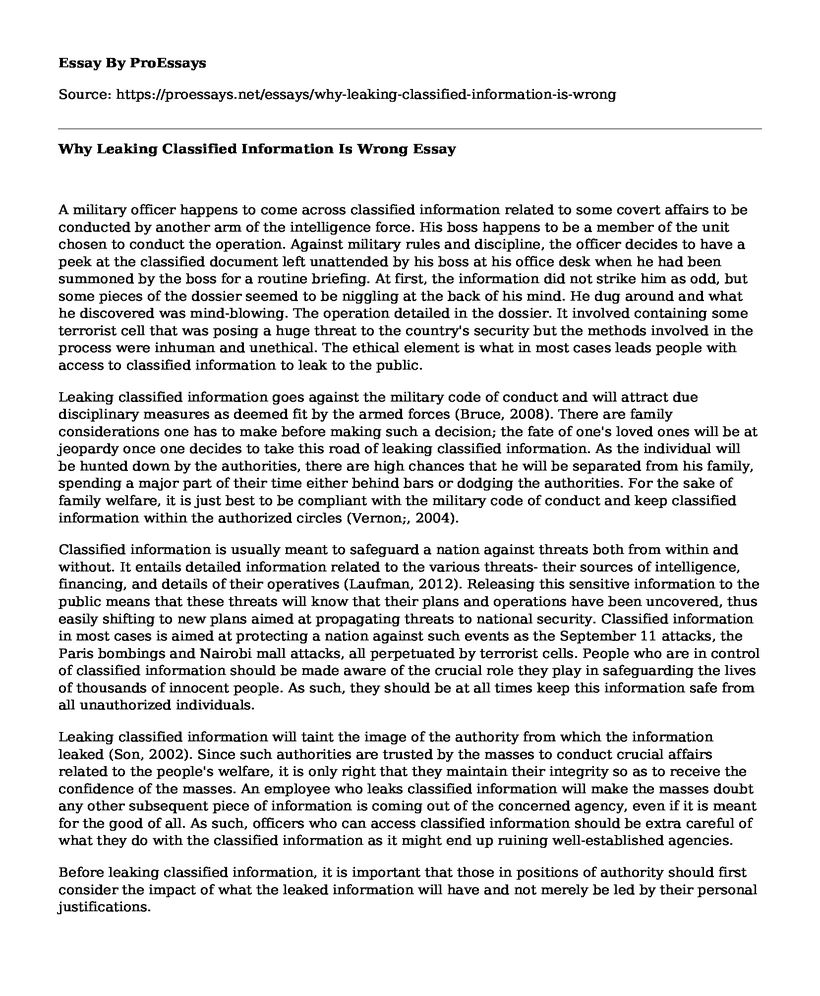A military officer happens to come across classified information related to some covert affairs to be conducted by another arm of the intelligence force. His boss happens to be a member of the unit chosen to conduct the operation. Against military rules and discipline, the officer decides to have a peek at the classified document left unattended by his boss at his office desk when he had been summoned by the boss for a routine briefing. At first, the information did not strike him as odd, but some pieces of the dossier seemed to be niggling at the back of his mind. He dug around and what he discovered was mind-blowing. The operation detailed in the dossier. It involved containing some terrorist cell that was posing a huge threat to the country's security but the methods involved in the process were inhuman and unethical. The ethical element is what in most cases leads people with access to classified information to leak to the public.
Leaking classified information goes against the military code of conduct and will attract due disciplinary measures as deemed fit by the armed forces (Bruce, 2008). There are family considerations one has to make before making such a decision; the fate of one's loved ones will be at jeopardy once one decides to take this road of leaking classified information. As the individual will be hunted down by the authorities, there are high chances that he will be separated from his family, spending a major part of their time either behind bars or dodging the authorities. For the sake of family welfare, it is just best to be compliant with the military code of conduct and keep classified information within the authorized circles (Vernon;, 2004).
Classified information is usually meant to safeguard a nation against threats both from within and without. It entails detailed information related to the various threats- their sources of intelligence, financing, and details of their operatives (Laufman, 2012). Releasing this sensitive information to the public means that these threats will know that their plans and operations have been uncovered, thus easily shifting to new plans aimed at propagating threats to national security. Classified information in most cases is aimed at protecting a nation against such events as the September 11 attacks, the Paris bombings and Nairobi mall attacks, all perpetuated by terrorist cells. People who are in control of classified information should be made aware of the crucial role they play in safeguarding the lives of thousands of innocent people. As such, they should be at all times keep this information safe from all unauthorized individuals.
Leaking classified information will taint the image of the authority from which the information leaked (Son, 2002). Since such authorities are trusted by the masses to conduct crucial affairs related to the people's welfare, it is only right that they maintain their integrity so as to receive the confidence of the masses. An employee who leaks classified information will make the masses doubt any other subsequent piece of information is coming out of the concerned agency, even if it is meant for the good of all. As such, officers who can access classified information should be extra careful of what they do with the classified information as it might end up ruining well-established agencies.
Before leaking classified information, it is important that those in positions of authority should first consider the impact of what the leaked information will have and not merely be led by their personal justifications.
References
Bruce, J. (2008). The Consequences of Permissive Neglect a Central Intelligence Agency. Cia.gov. Retrieved 10 October 2016, from https://www.cia.gov/library/center-for-the-study-of-intelligence/csi-publications/csi-studies/studies/vol47no1/article04.html
Laufman, D. (2012). The Huffington Post. Retrieved 10 October 2016, from http://www.huffingtonpost.com/david-laufman/prosecuting-leaks_b_1585193.html
Son, T. (2002). Leaks: How Do Codes of Ethics Address Them?. Journal Of Mass Media Ethics, 17(2), 155-173. http://dx.doi.org/10.1207/s15327728jmme1702_05
Vernon;, D. (2004). Sensitive Versus Classified Information. Science, 306(5697), 811e-812e. http://dx.doi.org/10.1126/science.306.5697.811e
Cite this page
Why Leaking Classified Information Is Wrong. (2021, Mar 24). Retrieved from https://proessays.net/essays/why-leaking-classified-information-is-wrong
If you are the original author of this essay and no longer wish to have it published on the ProEssays website, please click below to request its removal:
- Research Paper on Body-Worn Program Implementation
- Essay Sample on Mental Illness & Gun Laws: Designing & Rulemaking for Implementation
- Crime and Justice: A Systematic Analysis
- Essay Sample on Letter from Birmingham Jail: MLK's Rhetoric Tactics
- Essay Example on Criminal Justice System: Media's Role in Informing Society
- Essay Example on Wind Turbines: Safe Renewable Energy for Climate and Human Health
- Essay Sample on US Technological Innovations: Fueling Growth and Economic Expansion







